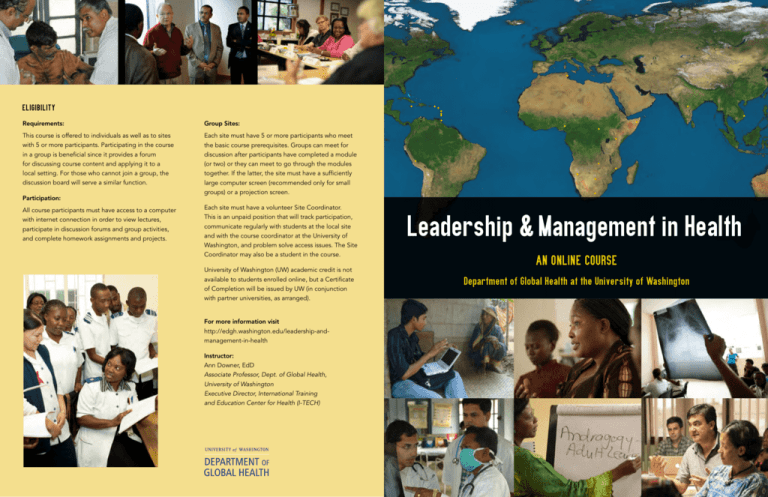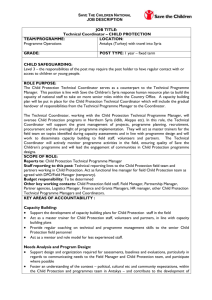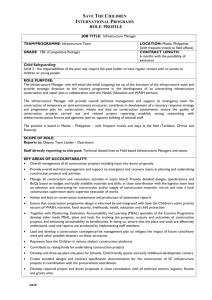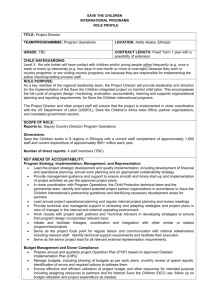leadership & Management in Health
advertisement

Eligibility Requirements: Group Sites: This course is offered to individuals as well as to sites with 5 or more participants. Participating in the course in a group is beneficial since it provides a forum for discussing course content and applying it to a local setting. For those who cannot join a group, the discussion board will serve a similar function. Each site must have 5 or more participants who meet the basic course prerequisites. Groups can meet for discussion after participants have completed a module (or two) or they can meet to go through the modules together. If the latter, the site must have a sufficiently large computer screen (recommended only for small groups) or a projection screen. Participation: All course participants must have access to a computer with internet connection in order to view lectures, participate in discussion forums and group activities, and complete homework assignments and projects. Each site must have a volunteer Site Coordinator. This is an unpaid position that will track participation, communicate regularly with students at the local site and with the course coordinator at the University of Washington, and problem solve access issues. The Site Coordinator may also be a student in the course. University of Washington (UW) academic credit is not available to students enrolled online, but a Certificate of Completion will be issued by UW (in conjunction with partner universities, as arranged). For more information visit http://edgh.washington.edu/leadership-andmanagement-in-health Instructor: Ann Downer, EdD Associate Professor, Dept. of Global Health, University of Washington Executive Director, International Training and Education Center for Health (I-TECH) Leadership & Management in Health An online course Department of Global Health at the University of Washington Leadership & Management in Health focuses on the practical leadership and management skills that are required for working in complex local, regional, national, and global health environments. Participants will develop a clear sense of the issues associated with the organization, financing, and delivery of health care services within a global health context. Personal leadership development and practical management skills are both emphasized. Learning Objectives: Course Schedule: Participants completing the course at the highest level of achievement should be able to: Leading and Managing Frameworks Supervision and Delegation Skills What is the difference between leadership and management? What are the skills associated with each? How can we measure the impact of effective leadership and management on health care systems? What are the important principles of delegating and coaching? How can you prepare for difficult conversations? What questions should a performance review answer? What tools can you use to analyze performance problems? • Approach management challenges in primary health care settings with core knowledge and skills in economic, organizational, and management theory as a guide; • Pose meaningful questions about what constitutes effective management and leadership in different cultural and organizational contexts; • Make decisions that weigh practical needs and conditions with ethical, legal, and compliance considerations; • Use core principles and tools from human resources and finance to address challenges and solve problems; • Translate insights from self-assessment into personal plans for improving leadership and management skills; • Identify and consult appropriate sources of data for making sound management decisions; • Align and motivate individuals, systems, and resources toward a common purpose; • Design and manage systems that are responsive to donor and Ministry of Health requirements and assure financial and ethical accountability; • Identify monitoring and evaluation methods that answer key questions about programmatic efficiency and effectiveness; and • Use active participation in class discussion, activities, and assignments to form a personal and professional value system for management and leadership in global health. Accountability What is the accountability cycle? How can you increase Conflict Management individual and team accountability for quality work in your organization? How does conflict impact team dynamics and teamwork? How comfortable are you with conflict? What are some cultural differences in how people express and respond to conflict? What actions can you take to resolve conflict within a team? The 7 Habits of Highly Effective People (Covey) How can you apply the 7 habits to increase your proactive thinking patterns, clarify your values, plan your work more effectively, management time better, listen, negotiate and mediate more skillfully, create cooperation, and grow professionally? Influence without Authority What is the difference between positional and personal power? How can you use reciprocity and currency exchange to increase influence? Building Strong Teams What are the key characteristics of highly functioning teams? What threatens the effectiveness of a team? How can you be more effective in leading meetings, building teams and managing conflict. “As a student of the course itself, it left an indelible mark on me... what better way to ingrain the principles of leadership and management than to implement them.” K en ya ( Med i ca l O f f i cer, M o i T ea chin g a n d R ef erra l Ho s pi ta l ) . Systems Thinking What is the difference between event-oriented and systems thinking? How do you model a system of concern? How can you exert influence from your position? Financial Management What are the principles of financial management? What are financial controls? What are the roles and obligations of the leader and manager in relation to financial management? “I have found that since I started this course I have a different outlook that has made me a better team player who depends on collaboration with the stakeholders to get the jobs done.” Co ur s e participan t f rom Trinid ad and T o bago Data for Management Decision-Making Which data sources are important for purposes of accountability vs. program effectiveness? How do different donor agencies approach the issue of performance management? How can health leaders and managers create an organizational culture of information generation and use? Project Management What are the steps in the project management cycle? How can you apply project management skills to your current work in order to improve quality and productivity? Communicating Effectively What are your strengths and weaknesses in verbal, written, and virtual communication? How can you improve your ability to speak spontaneously? What are the elements of persuasive communication? How can you use storytelling to strengthen your impact? Leadership & Management in Health focuses on the practical leadership and management skills that are required for working in complex local, regional, national, and global health environments. Participants will develop a clear sense of the issues associated with the organization, financing, and delivery of health care services within a global health context. Personal leadership development and practical management skills are both emphasized. Learning Objectives: Course Schedule: Participants completing the course at the highest level of achievement should be able to: Leading and Managing Frameworks Supervision and Delegation Skills What is the difference between leadership and management? What are the skills associated with each? How can we measure the impact of effective leadership and management on health care systems? What are the important principles of delegating and coaching? How can you prepare for difficult conversations? What questions should a performance review answer? What tools can you use to analyze performance problems? • Approach management challenges in primary health care settings with core knowledge and skills in economic, organizational, and management theory as a guide; • Pose meaningful questions about what constitutes effective management and leadership in different cultural and organizational contexts; • Make decisions that weigh practical needs and conditions with ethical, legal, and compliance considerations; • Use core principles and tools from human resources and finance to address challenges and solve problems; • Translate insights from self-assessment into personal plans for improving leadership and management skills; • Identify and consult appropriate sources of data for making sound management decisions; • Align and motivate individuals, systems, and resources toward a common purpose; • Design and manage systems that are responsive to donor and Ministry of Health requirements and assure financial and ethical accountability; • Identify monitoring and evaluation methods that answer key questions about programmatic efficiency and effectiveness; and • Use active participation in class discussion, activities, and assignments to form a personal and professional value system for management and leadership in global health. Accountability What is the accountability cycle? How can you increase Conflict Management individual and team accountability for quality work in your organization? How does conflict impact team dynamics and teamwork? How comfortable are you with conflict? What are some cultural differences in how people express and respond to conflict? What actions can you take to resolve conflict within a team? The 7 Habits of Highly Effective People (Covey) How can you apply the 7 habits to increase your proactive thinking patterns, clarify your values, plan your work more effectively, management time better, listen, negotiate and mediate more skillfully, create cooperation, and grow professionally? Influence without Authority What is the difference between positional and personal power? How can you use reciprocity and currency exchange to increase influence? Building Strong Teams What are the key characteristics of highly functioning teams? What threatens the effectiveness of a team? How can you be more effective in leading meetings, building teams and managing conflict. “As a student of the course itself, it left an indelible mark on me... what better way to ingrain the principles of leadership and management than to implement them.” K en ya ( Med i ca l O f f i cer, M o i T ea chin g a n d R ef erra l Ho s pi ta l ) . Systems Thinking What is the difference between event-oriented and systems thinking? How do you model a system of concern? How can you exert influence from your position? Financial Management What are the principles of financial management? What are financial controls? What are the roles and obligations of the leader and manager in relation to financial management? “I have found that since I started this course I have a different outlook that has made me a better team player who depends on collaboration with the stakeholders to get the jobs done.” Co ur s e participan t f rom Trinid ad and T o bago Data for Management Decision-Making Which data sources are important for purposes of accountability vs. program effectiveness? How do different donor agencies approach the issue of performance management? How can health leaders and managers create an organizational culture of information generation and use? Project Management What are the steps in the project management cycle? How can you apply project management skills to your current work in order to improve quality and productivity? Communicating Effectively What are your strengths and weaknesses in verbal, written, and virtual communication? How can you improve your ability to speak spontaneously? What are the elements of persuasive communication? How can you use storytelling to strengthen your impact? Eligibility Requirements: Group Sites: This course is offered to individuals as well as to sites with 5 or more participants. Participating in the course in a group is beneficial since it provides a forum for discussing course content and applying it to a local setting. For those who cannot join a group, the discussion board will serve a similar function. Each site must have 5 or more participants who meet the basic course prerequisites. Groups can meet for discussion after participants have completed a module (or two) or they can meet to go through the modules together. If the latter, the site must have a sufficiently large computer screen (recommended only for small groups) or a projection screen. Participation: All course participants must have access to a computer with internet connection in order to view lectures, participate in discussion forums and group activities, and complete homework assignments and projects. Each site must have a volunteer Site Coordinator. This is an unpaid position that will track participation, communicate regularly with students at the local site and with the course coordinator at the University of Washington, and problem solve access issues. The Site Coordinator may also be a student in the course. University of Washington (UW) academic credit is not available to students enrolled online, but a Certificate of Completion will be issued by UW (in conjunction with partner universities, as arranged). For more information visit http://edgh.washington.edu/leadership-andmanagement-in-health Instructor: Ann Downer, EdD Associate Professor, Dept. of Global Health, University of Washington Executive Director, International Training and Education Center for Health (I-TECH) Leadership & Management in Health An online course Department of Global Health at the University of Washington







